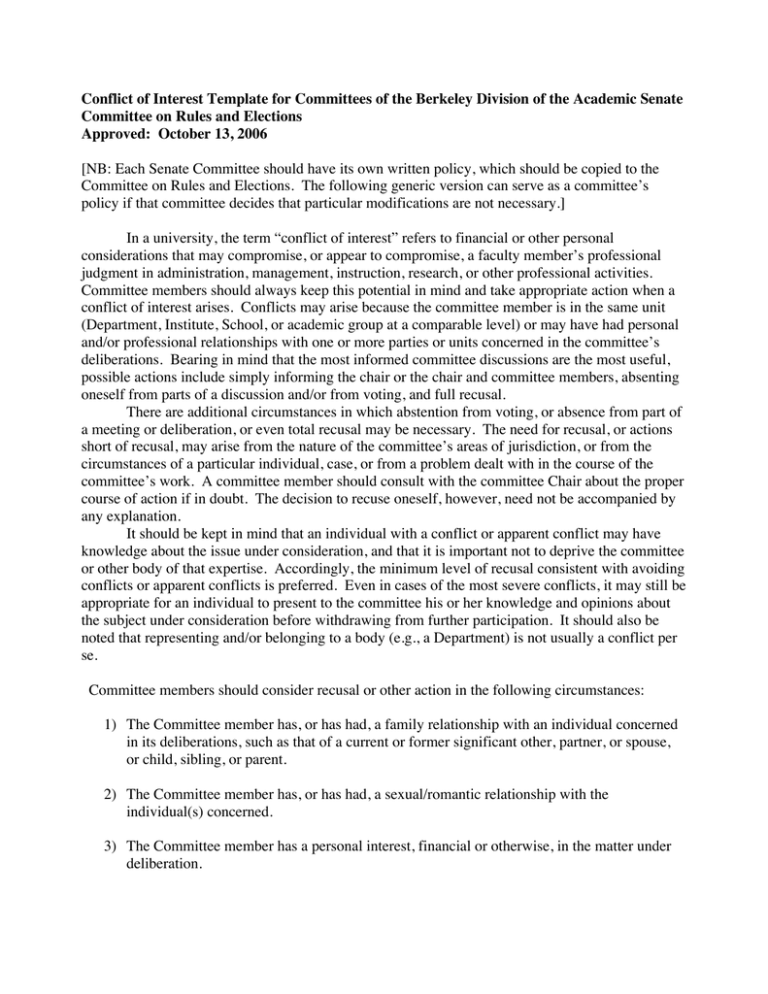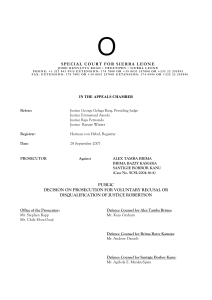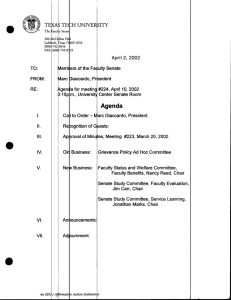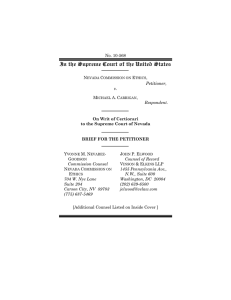
Conflict of Interest Template for Committees of the Berkeley Division of the Academic Senate
Committee on Rules and Elections
Approved: October 13, 2006
[NB: Each Senate Committee should have its own written policy, which should be copied to the
Committee on Rules and Elections. The following generic version can serve as a committee’s
policy if that committee decides that particular modifications are not necessary.]
In a university, the term “conflict of interest” refers to financial or other personal
considerations that may compromise, or appear to compromise, a faculty member’s professional
judgment in administration, management, instruction, research, or other professional activities.
Committee members should always keep this potential in mind and take appropriate action when a
conflict of interest arises. Conflicts may arise because the committee member is in the same unit
(Department, Institute, School, or academic group at a comparable level) or may have had personal
and/or professional relationships with one or more parties or units concerned in the committee’s
deliberations. Bearing in mind that the most informed committee discussions are the most useful,
possible actions include simply informing the chair or the chair and committee members, absenting
oneself from parts of a discussion and/or from voting, and full recusal.
There are additional circumstances in which abstention from voting, or absence from part of
a meeting or deliberation, or even total recusal may be necessary. The need for recusal, or actions
short of recusal, may arise from the nature of the committee’s areas of jurisdiction, or from the
circumstances of a particular individual, case, or from a problem dealt with in the course of the
committee’s work. A committee member should consult with the committee Chair about the proper
course of action if in doubt. The decision to recuse oneself, however, need not be accompanied by
any explanation.
It should be kept in mind that an individual with a conflict or apparent conflict may have
knowledge about the issue under consideration, and that it is important not to deprive the committee
or other body of that expertise. Accordingly, the minimum level of recusal consistent with avoiding
conflicts or apparent conflicts is preferred. Even in cases of the most severe conflicts, it may still be
appropriate for an individual to present to the committee his or her knowledge and opinions about
the subject under consideration before withdrawing from further participation. It should also be
noted that representing and/or belonging to a body (e.g., a Department) is not usually a conflict per
se.
Committee members should consider recusal or other action in the following circumstances:
1) The Committee member has, or has had, a family relationship with an individual concerned
in its deliberations, such as that of a current or former significant other, partner, or spouse,
or child, sibling, or parent.
2) The Committee member has, or has had, a sexual/romantic relationship with the
individual(s) concerned.
3) The Committee member has a personal interest, financial or otherwise, in the matter under
deliberation.
4) The Committee member is aware of any prejudice, pro or contra, which would impair his or
her judgment in the matter under discussion. [NB: open and honest intellectual disagreement
is not cause for recusal.]
5) The Committee member believes that his or her recusal is necessary to preserve the integrity
of the committee’s deliberations.
6) The Committee member serving as representative of the Senate on a non-Senate committee
judges that his or her presence or actions may be at odds with his or her responsibilities as a
Senate member.



